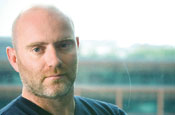If you're not yet on Facebook, you're in a dwindling minority. It's the media story of the year and everyone wants to share in its success.
Microsoft secured its own piece of the action in October when it bought a $240m (£118m) stake in the social utility site. Not social network, you note. The new line is that it is a tool, like e-mail or search, for managing off-line relationships online.
It is also the future of the internet, according to Alex Marks, UK head of marketing for Microsoft Digital Advertising Solutions. Which certainly explains his firm's willingness to pay what many consider a disproportionate sum for a company valued at $50bn (£24.6bn).
"If you think about digital media developing, it's the same as human civilisation. Facebook satisfies basic human needs, to exchange ideas, find partners, and so on," asserts Marks. "It's been going on for thousands of years; the internet just helps us do it slightly quicker.
"In countries with 100% penetration, internet behaviour is much more community-based. From Microsoft's perspective, to have a stake in a business leading the way in doing that is important."
So far that stake has given it exclusive rights to sell banner advertising in all the site's UK-brokered deals.
Quite what else might come from its investment, Marks insists he doesn't know, but merely to be associated with the media business du jour is enough for now, he implies.
Risk aversion
There may of course have been another motivation - by grabbing its own share, it knocked out the risk of competitors such as Google or Yahoo! getting in instead.
Marks denies this was behind the move, but admits that "any acquisition strategy is to strengthen it from a strategic viewpoint or to defend it from rival companies".
Beyond Facebook, Microsoft has - like its rivals - been on the acquisition trail this year, for example, its massive $6bn investment in digital marketing firm aQuantive in May. How these composite parts will all fit together is yet to unfold, but they are all part of broadening Microsoft's image from primarily a software company, to a thoroughly modern media company.
"It's a big portfolio of different advertising opportunities, audiences, channels and experiences," Marks explains. "Most advertisers will want a bit of each, dependent on who they want to talk to and what they want to talk about. That's a really nice place to be in."
Indeed, Marks - who has hopped around an array of companies in his 12 years in the business - claims his current employer is in prime position to take advantage of today's integrated and converged landscape.
"Success in marketing now requires some degree of technological solution. We have historically had a very strong relationship with businesses and consumers from a technological perspective and also with consumers from an online perspective," he says.
"There aren't many businesses in the world that can provide both."
So, Marks certainly doesn't see Microsoft's origins as a software company as a hindrance. In fact, he proffers, it gives it the edge over the competition - invaluable given its revenue growth ambitions for search and online advertising.
"Google has a huge market share (in search), some would say unhealthy," he concedes. "But look at ITV when it was 70% of commercial viewing. Then Channel 4 and Five launched and we saw slow erosion. People forget that this market is still very young - only five or six years in terms of any real critical mass."
Balanced market
The rivalry between "the big three" - along with Yahoo! - is unavoidable, but Marks insists that it does not preoccupy him.
"People ask me 'what are you doing to beat Google?'," he admits. "It's not about beating them; it's about creating a balance in the market. From an advertiser's perspective, it's better if they have more choice - it pushes search engines to develop better solutions. And our share is growing all the time."
That's not the only mark of success. Marks is currently basking in his team's shortlisting for the Media Week sales team of the year award - proof, he says, of how far the firm has come.
"Some of the team were disappointed (we didn't win), but I said that we have to remember we're a pure-play outfit and to be talked about in the same breath as established brands is really good," he says.
Former I-Level colleague Ed Ling agrees, crediting Marks' energy for helping to boost Microsoft's visibility with both agencies and the advertising community at large.
"He's a larger than life character with real energy for everything he does," says Ling. "And he likes a challenge, which is no bad thing."
Heading into 2008, with revenue targets doubled, threats from new competitors such as Orange, Sky and newspaper brands, and of course its old rivals Google and Yahoo!, Marks' bosses would surely agree.
CV
2006: Head of UK marketing, Microsoft Digital Advertising Solutions
2004: Marketing and new business director, I-Level Group
2001: Marketing manager, Opus (GWR Group)
1999: Broadcast strategist, Capital Radio
1997: Broadcast planner and buyer, Manning Gottlieb Media
1995: Graduate trainee, Zenith.


